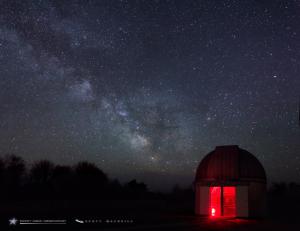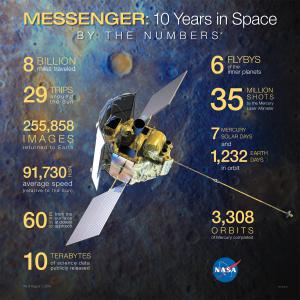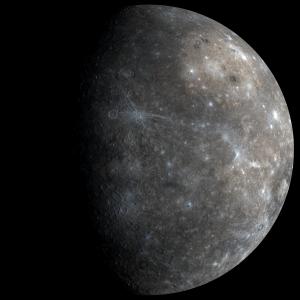
Public Stargazing
- Where:
- Frosty Drew Observatory
- When:
- Friday April 24, 2015 at 8:00 p.m.
- Cost:
- $1 Suggested Donation per Person
Tonight's forecast is calling for partly cloudy skies in the last afternoon, becoming clear early this evening with wind. The 43% waxing crescent Moon will be in our Western skies until around 1:00 a.m. offering us spectacular views of the Lunar Terminator, which is where sunlight fades into shadow on the lunar surface. After which, super dark skies will remain. We can expect winds at the observatory upwards of 10-12mph, gusting to 21mph. Gusts at that level are a bit high for telescope use and may restrict our viewing to the Eastern and Southern skies. Otherwise, tonight could be an excellent night to catch stunning views of the Moon and Jupiter with deep sky objects and Saturn visible later in the night.
We plan to open the Observatory and Sky Theatre at 8:00 p.m. In the Observatory, telescopes will showcase Venus' fabulous waning gibbous phase, Jupiter and the four Galilean Moons with the Great Red Spot (GRS) becoming visible around 8:30 p.m., the crescent Moon, and a handful of binary stars, nebulae, and star clusters. Once the Moon sets, we will direct our telescopes towards some spring time galactic viewing. The Sky Theatre will have either a slide show of astrophotos shot at Frosty Drew Observatory or a live projection from a telescope. Spring nights can be a bit chilly and temps tonight will descend into the 30's. So dressing for moderate winter conditions is appropriate. The heated Sky Theatre will offer a relaxing break from the cold for those too eager to cast off winter.
Overall, tonight looks to be an excellent night to be under the stars. The Lyrid Meteor Shower, though past peak, is still quite active and putting on a show of shooting stars. This past week and a half has been fabulous at Frosty Drew Observatory with numerous sky watchers and photographers descending on Charlestown. Get out there tonight and see what all the rage is about and make your own discovery of the fabulous starscape at Frosty Drew Observatory.
-------------------------------------------------------------------------
Weekly Happenings
Scott MacNeill
This coming Thursday, April 30th will mark the official end of the NASA MESSENGER mission when the revered spacecraft, which has been orbiting the planet Mercury for four years, makes its final descent into Mercury's atmosphere going out with a glorious bang when it impacts the surface of the closest planet to the Sun.
The MErcury Surface, Space ENvironment, GEochemistry, and Ranging (MESSENGER) mission launched from Earth on August 3rd 2004 embarking on its historical six and a half year journey to Mercury. The purpose of the MESSENGER mission was to study the geological history, magnetic field, and surface of the balmy planet. The mission, which arrived at Mercury on March 18th 2011, was scheduled to spend one Earth year studying Mercury. Well the early scientific discoveries that MESSENGER made, led to a significant increase in mission extension by an extra three years. With a limited supply of helium gas, which fuels the mission, NASA engineers had to develop strategies to conserve fuel for the extended mission. The last of these crafty maneuvers will take place today, effectively exhausting MESSENGER of its remaining helium gas. Gravity always wins, and MESSENGER will now begin its descent to its final destination on the surface of Mercury.
Among the amazing science and discoveries that MESSENGER has made is the huge increase in evidence that Mercury has an abundance of water ice on the floors of dark craters at the polar regions and that water was likely delivered by comets and asteroids. Massive technological innovations came about as a result of the intense heat and radiation MESSENGER was exposed to. Overall, there are too many discoveries to list here, though you can catch up on the fascinating achievements of the MESSENGER mission. Then give it up for a remarkable spacecraft that changed our view of Mercury, the closest planet to the Sun.
-Scott


